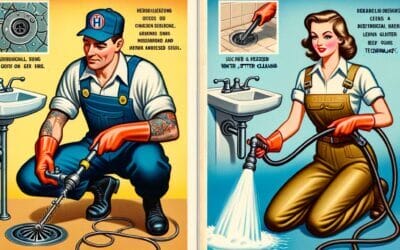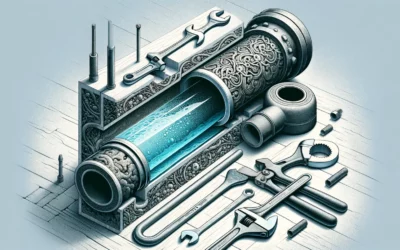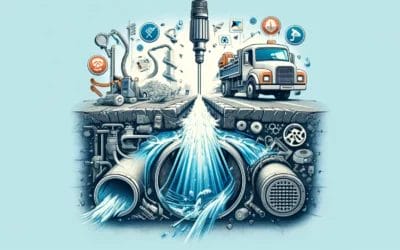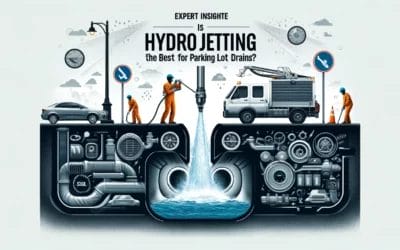Welcome! In this post, we are going to explore a crucial topic that is often overlooked; the differences between gas tankless and heat pump water heaters. Are you in a dilemma choosing between the two? Worry not! This comparative analysis, based on warranty terms and expert views, will answer all of your questions. By providing fact-based information, we aim to educate and guide you in making an informed decision. Not only will this help to meet your specific environmental and economical needs, but also ensure long-term feasibility. So, delve right in to find out more!
Understanding Different Types of Water Heaters: Gas Tankless and Heat Pump Types
With increasing focus on energy efficiency, cost-effectiveness, and sustainability, it’s no wonder that the debate between Gas tankless and Heat pump water heaters continues. These water heater types have significant differences in terms of their functionality, cost, lifespan, and environmental impact.
Gas Tankless Water Heaters, as the name implies, operates on gas and does not possess a storage tank. Instead, it heats the water directly as it passes through its heat exchanger. This ‘on-demand’ approach eliminates standby energy losses associated with traditional water tanks, making it a potentially energy-efficient choice. However, these models generally carry a higher upfront cost.
- Efficiency: Gas tankless units have a high energy factor (EF) rating – a measure of the unit’s energy efficiency, implying they can be a good choice for cost savings in the long run.
- Lifespan: These units typically last longer than traditional tank units, about 20+ years.
- Environmental Impact: While they reduce energy losses, they burn gas, which does contribute to CO2 emissions.
On the other hand, Heat Pump Water Heaters use electricity to move heat from one place to another, essentially recycling the heat available in the surroundings to heat the water. While their operational costs may be lower than gas tankless units, they require a substantial amount of space and work best in climates that don’t hit freezing temperatures.
- Efficiency: Heat pump units can be 2-3 times more energy-efficient compared to traditional electric water heaters.
- Lifespan: These units typically have a 10-15 years lifespan.
- Environmental Impact: They emit no greenhouse gases if the electricity is derived from renewable sources.
To illustrate the differences more clearly, below is a comparative table of gas tankless and heat pump heaters:
| Parameter | Gas Tankless | Heat Pump |
|---|---|---|
| Efficiency | High | Medium to High |
| Lifespan | Long (20+ years) | Moderate (10-15 years) |
| Environmental Impact | Medium | Low (If powered by renewables) |
When choosing between these two, it’s beneficial to consider your specific needs, environmental conditions, and long-term economic factors. Both these models are excellent alternatives to traditional units and are worthy of consideration to meet your household or commercial needs.
The Basics: How Do Gas Tankless and Heat Pump Water Heaters Work?
When discussing water heaters, two review-worthy options are the gas tankless and heat pump models. Let’s break down how each of these heaters work. Gas tankless water heaters, as the name suggests, heat the water without using a storage tank. Whenever a hot water tap is turned on, the water flows through a pipe and into the unit where a gas burner heats it. This mechanism ensures a constant supply of hot water, but the rate might be limited.
On the other hand, heat pump water heaters (also known as hybrid water heaters), utilize electricity to move heat from one place to another instead of generating heat directly. This makes them more energy-efficient than traditional electric water heaters. Heat pump water heaters contain an on-board computer that controls an energy-saving fan, uses advanced sensors, maintains water temperature, and switches to energy-saving mode during periods of low usage. A fan draws air through the heat exchanger coil and into the tank to heat the water. Here’s a brief comparison of the two:
| Gas Tankless Water Heaters | Heat Pump Water Heaters | |
|---|---|---|
| Heating Mechanism | Uses a gas burner to heat water as it passes through a pipe | Moves heat around to warm water; more energy efficient |
| Supply Rate | Can limit the rate of hot water if usage is high | Can provide stable hot water supply, even during periods of high demand |
| Energy Usage | Low energy efficiency | High energy efficiency due to utilization of heat transfer |
When choosing between these two, consider their individual benefits and drawbacks alongside your specific hot water needs and available energy sources. This decision should be made on a case-by-case basis. Remember, the ultimate aim is efficient hot water delivery.
Pros and Cons of Gas Tankless Water Heaters: An In-depth Analysis
Beginning with the advantages of gas tankless water heaters, key fact number one is their ability to offer an unlimited supply of hot water. With a high flow rate, no matter the number of appliances requiring hot water, the system can manage it effectively. This stands in stark contrast to conventional heaters that store hot water and might run out after continuous use. Moreover, being energy efficient, gas tankless water heaters are more environmentally friendly and also reduce utility bills. Furthermore, these heaters often have a lifespan of over 20 years, outliving traditional heaters significantly.
- Possess high flow rates
- Energy efficient
- Lifespan of 20+ years
Moving on, we come to the disadvantages that go hand in hand with gas tankless water heaters. The foremost drawback is the high initial cost. Installation involving gas lines and venting facilities can be relatively expensive. Also, depending on the existing system of your house, you may need to invest in additional gas lines. Although they last long, their repair and replacement parts tend to be comparatively expensive. Lastly, while they do provide a continuous supply of hot water, during periods of high demand, the water temperature could vary slightly making your hot water experience unsatisfactory.
- High initial cost
- Expensive repair and replacement parts
- Possible fluctuation in water temperature
| Gas Tankless Water Heaters | Pros | Cons |
|---|---|---|
| Flow rates | High | – |
| Energy efficiency | High | – |
| Lifespan | 20+ years | – |
| Initial cost | – | High |
| Repair cost | – | High |
| Water temperature stability | – | Variable |

Pros and Cons of Heat Pump Water Heaters: Thorough Examination
Understanding the Advantages of Heat Pump Water Heaters Heat Pump Water Heaters have gained traction in recent years for their energy efficiency, eco-friendliness, and cost-effectiveness over the long term. These units operate by absorbing heat from the air or ground, amplifying it, and then transferring it to water, hence saving a significant amount of energy in comparison to traditional methods. What sets them apart is their lower operating costs; heat pump water heaters can save homeowners up to 60% in energy costs annually. Furthermore, these units are eco-friendly as they don’t emit harmful gases into the environment.
- Energy Efficiency: The unit’s energy saving feature enables cost reduction in the long term.
- Eco-friendly: Heat pump water heaters do not contribute to greenhouse gas emissions or global warming.
- Quiet Operation: These units run silently, thus maintaining peace and tranquility in your home.
Analyzing the Challenges of Heat Pump Water Heaters Despite their numerous benefits, Heat Pump Water Heaters are not without limitations. Notably, they have a higher upfront cost than standard electric or gas water heaters. Additionally, they require significant installation space due to their sophisticated mechanism. Especially in frigid climates, heat pump water heaters may not maintain their operational efficiency due to the minimal availability of ambient heat, thus calling for a back-up electric heater.
- Upfront Costs: The initial purchase and installation costs can be discouraging for some homeowners.
- Space Requirements: Installation may be burdensome in homes with limited space.
- Climate Consideration: These units are less efficient in colder climates.
These factors should be kept in mind when considering the transition to a heat pump water heater. It can be helpful to discuss these factors with a knowledgeable professional to ensure that this type of water heater aligns with your home’s specific needs and your budget. However, it’s also worth keeping in mind that these units come with extended warranties, offering protection and peace of mind for homeowners in the event of any unforeseen complications.
| Heat Pump | Gas Tankless |
|---|---|
| High upfront costs | Lower upfront costs |
| Lower operating costs | Higher operating costs |
| Large installation space required | Requires less space |

Comparative Analysis: Gas Tankless Vs Heat Pump Water Heaters
Energy Efficiency & Costing When comparing the gas tankless water heaters with the heat pump water heaters, efficiency and costs come into light. Gas tankless systems are more energy efficient and provide hot water instantly. However, the upfront costs of these systems are higher. A gas tankless water heater can range from $1,000 to $3,000 including the installation charges. On the other hand, heat pump water heaters use electricity rather than gas. They extract heat from the air and utilize it to heat the water. Their initial cost is substantially lower, ranging from $500 to $1,500, yet they consume more energy, which can raise your electricity bill. “`html
| Water Heater Type | Upfront Cost of equipment Only | Energy Consumption |
|---|---|---|
| Gas Tankless | $1,000 – $3,000 | Low |
| Heat Pump | $500 – $1,500 | High |
“` Life Expectancy & Warranties As an industry standard, warranties for gas tankless water heaters typically range from 5-10 years. However, it’s important to remember that they generally have a longer lifespan, reaching up to 20 years. They also require minimal space and are considered easier to repair. Heat pump water heaters usually have warranties from 3-10 years. Despite the shorter warranty period, when properly maintained, they can last for approximately 14 years. But compared to their gas counterparts, their maintenance can be more complex due to the additional components and technology used. “`html
| Water Heater Type | Warranty Period | Life Expectancy |
|---|---|---|
| Gas Tankless | 5 – 10 years | 20 years |
| Heat Pump | 3 – 10 years | 14 years |
“`
How to Choose the Right One: Manufacturer Warranties and Expert Opinions
When comparing gas tankless and heat pump water heaters, the manufacturer’s warranty is an essential factor to consider. Manufacturer warranties cover various aspects such as parts, labor, and heat exchanger, providing you security and peace of mind. Ideal warranties should cover a significant amount of time, ranging from 5 to 12 years. Not restricted to the coverage duration, but also pay attention to the aspects the warranty covers, such as parts, tank, and labor. Some manufacturers may only offer limited coverage, while others may provide comprehensive protection, encompassing even the smallest components. It’s also crucial to take into account the expert opinions on the competing water heaters. Experts in the field, professionals who install and service these products regularly, have hands-on knowledge about the product’s lifespan, efficiency, and durability. They can provide insights not just based on the manufacturer’s claims but real-life experiences. You can refer to online tech forums, review websites for consumers, or even local HVAC installers for expert opinions. It’s wise to be informed about their views on build quality, ease of installation, performance, and after-sales service potency.
| Gas Tankless Water Heaters | Heat Pump Water Heaters |
|---|---|
| Usually offers 5-10 years warranty | Typically provides 6-12 years warranty |
| Experts mention higher efficiency | Experts praise for lower operational cost |
| Instant hot water supply | Energy saving and environmental friendly |
| Small in size, saving space | Can help in cooling the surrounding area |
“` Remember, the right choice depends on your household’s specific needs, local energy prices, and environmental considerations. A product with a grand warranty and excellent expert reviews might be a safe bet, however, make sure it suits your particular comfort and usage needs.
Importance of Warranties in Your Water Heater Purchase: Detailed Insights
Grasping the Value of Warranties The very essence of purchasing a water heater goes beyond the straightforward costs of the unit. Indeed, when analyzing wellbeing and cost-effectiveness, a significant aspect to consider is the warranty coverage. Typically, manufacturers offer warranties to make certain that your appliance functions excellently over its predicted lifespan. Not only do warranties cater for unforeseen malfunctions and defects, thereby eliminating the cost of repairs or replacements, they also give you a peace of mind knowing that you’ve invested in a high-quality and reliable product. Gas Tankless Vs. Heat Pump Water Heaters: Warranty Insights
When it comes to warranty, two common types of water heaters – gas tankless and heat pumps – offer immense value. Standard warranties for these water heaters fall between 5 to 10 years. However, they may differ dramatically in details. For instance, gas tankless water heaters usually include parts and heat exchanger warranties, whereas heat pump water heaters cover parts and compressor warranties.
| Water Heater Type | Warranty Coverage |
|---|---|
| Gas Tankless | Parts and Heat Exchanger |
| Heat Pump | Parts and Compressor |
It is of utmost importance to read through your warranty carefully. Understanding the terms will help you to maximize your coverage and minimize out-of-pocket expenses. A warranty should always be factored into the buying process – a better warranty often signifies a better manufactured product and real cost savings in the long run. And remember, always go with a trusted manufacturer that stands behind their product.
Expert Recommendations: Choosing Between Gas Tankless and Heat Pump Water Heaters
When deliberating over the choice between a gas tankless water heater and a heat pump water heater, several factors should be considered. Each heater type comes with its own set of advantages and challenges. Gas tankless heaters, for instance, offer higher flow rates and are typically less expensive to operate due to lower energy costs. They don’t take up as much space as traditional water heaters as they don’t require a storage tank. Furthermore, they provide a constant supply of hot water.
However, the upfront cost of a gas tankless water heater can be significantly higher than heat pump options.
Not to mention, these heaters can sometimes be demanding in terms of ventilation requirements and capacity. Heat pump water heaters, on the other hand, are incredibly energy efficient. They use electricity to move heat around, thereby using less energy to produce hot water. Heat pumps also tend to run quieter and are often more environmental friendly.
| Heater Type | Advantages | Challenges |
|---|---|---|
| Gas Tankless Heater | Higher flow rates, lower energy costs, saves space, constant hot water supply | Higher upfront cost, stringent ventilation requirements |
| Heat Pump Water Heater | Energy efficient, quieter, environmental friendly | Needs significant amount of space for installation |
As you ponder over which heater to pick, consider extra factors like the climate you live in, the availability of natural gas or electricity in your area, and the size of your household. Your decision should also depend on your long-term plans, as these heaters can last anything from 10 to 20 years. Therefore, it’s essential to choose dependable, energy-efficient solutions that will serve you well for years to come.
Overall, both options could potentially be smart decisions. It all comes down to your individual needs and circumstances. Therefore, it’s advisable to seek expert consultations to make the right choice. After all, an efficient water heater is not just about saving energy; it’s also about ensuring comfort for your family.
Final Verdict: Which One is Better? Gas Tankless or Heat Pump Water Heaters
After thoroughly evaluating the pros and cons, expert opinions, and warranty options associated with both gas tankless and heat pump water heaters, there’s still a debatable verdict. Strictly speaking, the best option between a gas tankless and a heat pump water heater largely depends on individual circumstances. Certain requirements, household conditions, or even personal preferences may lean you into one choice over the other.
Gas tankless water heaters, indeed, offer quick water heating, high efficiency, and are mostly small-sized, making them perfect for households with limited space. On the downside, they often require expensive venting installation and may not be as environmentally friendly as a heat pump. In terms of warranty, gas tankless water heaters typically provide a range of 10-15 years, covering heat exchanger, parts, and labor.
Heat pump water heaters, meanwhile, stand out for their superior energy efficiency and eco-friendly features. They, however, tend to be larger and may not perform well in cold spaces. If you have ample room and live in a warm climate, a heat pump could be a wise choice. Warranty coverage for heat pump water heaters varies but typically falls in the 6-10 year range.
| Water Heater Type | Pros | Cons |
| Gas Tankless | Quick heating, High efficiency, Small-sized | Expensive venting, Less eco-friendly |
| Heat Pump | Superior energy efficiency, Eco-friendly | Larger size, Reduced performance in cold climates |
In a nutshell, no option is definitively better than the other. Instead, the choice between a gas tankless and a heat pump water heater should be based on your unique needs and circumstances. Consider consulting with a professional plumber for a more customized recommendation.
Key Takeaways
In conclusion, comparing gas tankless and heat pump water heaters is not about declaring one the definitive champion. Instead, it’s about identifying which system perfectly fits the specific needs of your household. Warranties and expert views give insights on reliability, efficiency, and operating costs, ultimately guiding you in making an informed decision. Remember, it’s an investment that contributes to your home’s comfort and efficiency, and should therefore afford you peace of mind. We hope that this comparison has clarified your options. Consider energy efficiency, cost-effectiveness, and warranty information, and also consult with professionals for the best choice tailored to your specific needs. It’s time to make your decision armed with the right information. Make your home not only a sanctuary of comfort, but also a beacon of smart and sustainable living.







